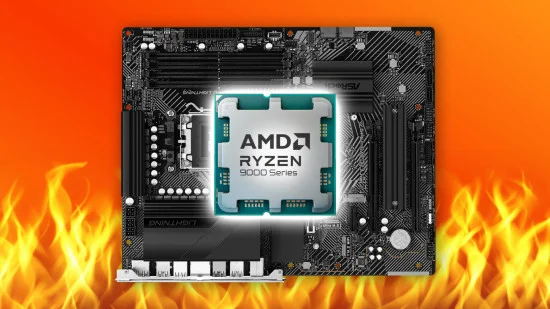
ASRock Confirms Aggressive BIOS Settings Behind Ryzen 9000 CPU Failures, Rolls Out Fix
Reports of AMD Ryzen 9000 series CPUs failing prematurely have been circulating for months, and now ASRock has acknowledged the issue, attributing it to overly aggressive PBO (Precision Boost Overdrive) settings on their AM5 motherboards. This revelation comes after initial denials and adds a layer of complexity to the already sensitive topic of CPU and motherboard compatibility.

According to a conversation Tech Yes City had with ASRock at Computex, the company's initial PBO presets supplied excessive amperage (current) to the processors, leading to their demise. Specifically, the Electric Design Current (EDC) and Thermal Design Current (TDC) limits were set too high for early CPU samples.
This issue appears to primarily affect high-end and mid-range ASRock boards. The aggressive settings, combined with liquid coolers and AIOs providing greater thermal headroom, exacerbated the problem, allowing PBO to push the CPUs beyond their limits.
Earlier, affected users reported CPU failures primarily on ASRock motherboards, with the company initially dismissing these reports as "misinformation" while also providing a BIOS update to resolve boot-up and memory compatibility issues. Now, however, ASRock seems to be admitting there's more to the story than "inconsistency" to reports of CPU failures.
AMD has so far declined to comment on the issue. This silence leaves questions about whether the fault lies solely with ASRock's implementation or whether AMD's specifications may also have contributed to the problem.

The fix, according to ASRock, involves a new BIOS update that lowers the current limits to match motherboards from other manufacturers. Crucially, the update also reportedly reduces "shadow voltages," settings not visible to users. While preliminary testing suggests no change in EDC and TDC values, the underlying adjustments aim to stabilize the CPU's power delivery.
It's important to update your BIOS if you own a high-end 9000-series ASRock board. You can check the latest release for your board via the ASRock website, which lists recent updates with "Optimize PBO settings."
What remains uncertain is the long-term impact on CPUs already subjected to these aggressive settings. Have they been permanently damaged? If a chip fails outside of warranty, who will be liable for replacement – AMD or ASRock? The ambiguity highlights the need for clearer communication and potential compensation plans for affected customers.
This situation raises several crucial questions: Will processors that have already been extensively used be permanently damaged? And in the event of failure outside warranty, will AMD or ASRock be responsible? Hopefully, further clarification will arrive soon from both companies.
Are you experiencing similar issues or have you updated your BIOS? Share your experiences and thoughts in the comments below!